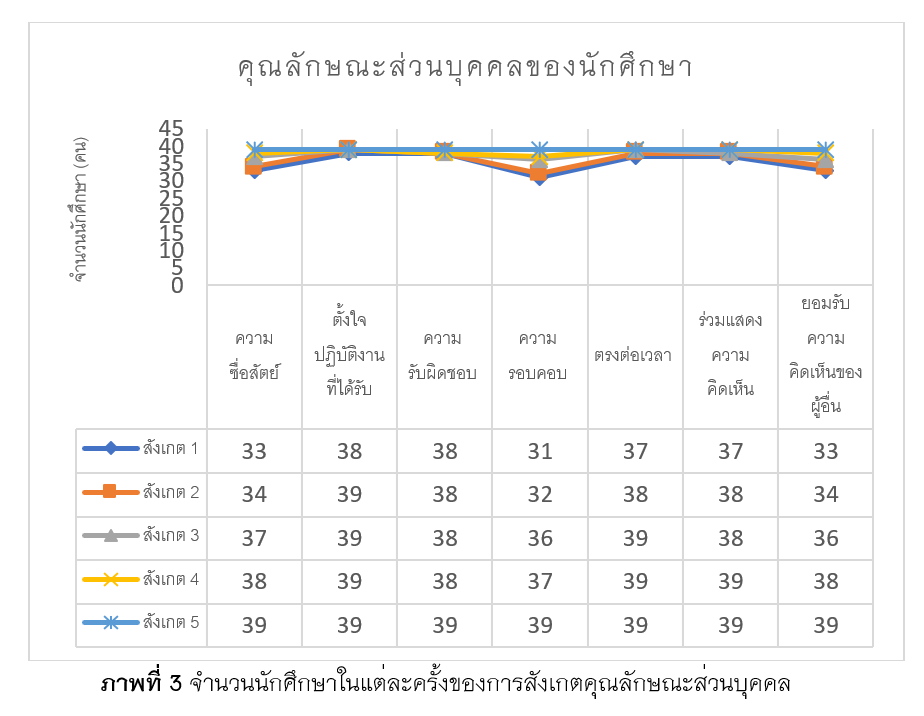Development of Authentic Assessment tools in Educational Measurement and Evaluation, Faculty of Education, Loei Rajabhat University
Keywords:
Authentic assessment, Tools of authentic assessmentAbstract
This research aimed to develop an authentic assessment tool and study the effects of using this tool in the course on measurement and evaluation of education at the Faculty of Education, Loei Rajabhat University. The target group comprised second-year students from Loei Rajabhat University's Faculty of Education, enrolled in course code 1042201, "Measurement and Evaluation of Education 1," with a class size of 39 students. The tools included a learning skills enhancement training set, achievement tests, activity sheets, and a personal characteristics evaluation form. The learning skills improvement set was rated using the E1/E2 index, the content validity was evaluated using the IOC index, the difficulty was rated using the item quality of the achievement tests, and the discriminative power was rated using the 27% Jung-Stephan technique. Analyze reliability using the Kuder-Richardson (KR-20) formula and the rating consistency using the Rater Agreement Index (RAI).
The findings revealed that 1) the development of the authentic assessment tool, which used the developed learning skills enhancement set, showed higher effectiveness than the predetermined standard. The activity sheets showed content validity ranging from 0.33 to 1.00. The reliability of the ratings for activities 1 to 5, calculated using the Rater Agreement Index (RAI), ranged from 0.92 to 1.00. The achievement tests showed content validity for all five sets between 0.62 and 1.00, difficulty levels between 0.24 and 0.86, discriminative power between 0.23 and 0.77, and reliability (KR-20) for each set ranging from 0.78 to 0.89. The personal characteristic evaluation covering 7 areas showed consistency between the score levels and the assessment criteria, ranging from 0.67 to 1.00. The reliability of the evaluation criteria, assessed using the Rater Agreement Index (RAI), ranged from 0.95 to 1.00. 2) The use of the developed authentic assessment tool, which focused on assessing learning through the learning skills enhancement set and activity sheets, revealed significant improvement in students' learning skills, indicating enhanced learning abilities. In terms of knowledge, students showed progress with each test, indicating better learning and a deeper understanding of the content. Regarding personal characteristics, all students showed responsibility, punctuality, and greater discussion participation.
References
จินตวีร์พร แป้นแก้ว, บุษยา สังขชาติ, นวพร ดำแสงสวัสดิ์ และ เทิดศักดิ์ นำเจริญ. (2562). การประเมินตามสภาพจริง. วารสารศึกษาศาสตร์ มหาวิทยาลัยบูรพา, 30(1), 22-33.
ฤตินันท์ สมุทร์ทัย, วีณา วโรตมะวิชญ และ เสาวนิตย์ เจริญชัย. (2562). การประเมินตามสภาพจริงของผลการเรียนรู้ตามกรอบมาตรฐานคุณวุฒิอุดมศึกษา ระดับปริญญาตรี สาขาศึกษาศาสตร์. วารสารครุศาสตร์ จุฬาลงกรณ์มหาวิทยาลัย, 47(4), 407-428.
รัตนะ บัวสนธ์. (2563). การวิจัยและพัฒนานวัตกรรมทางการศึกษา (พิมพ์ครั้งที่ 4). กรุงเทพฯ: สำนักพิมพ์จุฬาลงกรณ์มหาวิทยาลัย.
ศักดิ์ ยืนนาน, กนกวรรณ เอี่ยมชัย และ พิมลพรรณ เนียมหอม. (2563). การประเมินผลตามสภาพจริงในการเรียนรู้ออนไลน์: ก้าวสู่การประเมินผลการเรียนหลายรูปแบบสู่ความสำเร็จของผู้เรียน. วารสารการพยาบาล การสาธารณสุขและการศึกษา, 21(3).
สำราญ กำจัดภัย. (2559). การประเมินตามสภาพจริงในชั้นเรียน. วารสารวิชาการหลักสูตรและการสอน มหาวิทยาลัยราชภัฏสกลนคร, 23(8), 237-245.
วิเชียร อินทรสมพันธ์, ปราณีต ม่วงนวล และ ณัฐมน พันธ์ชาตรี. (2565). การจัดการเรียนรู้เชิงรุกและการประเมินผลการเรียนรู้ตามสภาพจริงด้วยแฟ้มสะสมงานอิเล็กทรอนิกส์สำหรับนักศึกษาครู. วารสารสถาบันวิจัยญาณสังวร, 12(2), 108-118.
Bakar, E. W., & Sulaiman, F. (2023). Vision to action: Exploring online reader’s theatre as an alternative assessment tool. European Proceedings of Educational Sciences. Form https://doi.org/10.15405/epes.23097.5.
Kong, S. C., & Yuen, C. N. (2022). An analysis of the attitudes and behaviours of university students and perceived contextual factors in alternative assessment during the pandemic using the attitude-behaviour–context model. Heliyon, 8(10). Form https://doi.org/10.1016/j.heliyon.2022.e11180.
Koonkaew, A. (2022). Test new approaches to measurement and evaluation of education. Bangkok: Chulalongkorn University.
Murphy, V., Fox, J., Freeman, S., & Hughes, N. (2017). “Keeping It Real”: A review of the benefits, challenges and steps towards implementing authentic assessment. All Ireland Journal of Higher Education, 9(3). Form https://ojs.aishe.org/index.php/aishe-j/article/view/280.
Ritjaroon, P. (2021). Learning measurement and evaluation techniques. Bangkok: Chulalongkorn University.
Sotiriadou, P., Logan, D., Daly, A., & Guest, R. (2020). The role of authentic assessment to preserve academic integrity and promote skill development and employability. Studies in Higher Education, 45(11), 2132–2148.
Sutadji, E., Susilo, H., Wibawa, A. P., Jabari, N. A., & Rohmad, S. N. (2021). Authentic assessment implementation in natural and social science. Education Sciences, 11(9), 534.
Vlachopoulos, D., & Makri, A. (2024). A systematic literature review on authentic assessment in higher education: Best practices for the development of 21st century skills, and policy considerations. Studies in Educational Evaluation, 83, 101425. form https://doi.org/10.1016/j.stueduc.2024.101425.

Downloads
Published
How to Cite
Issue
Section
License
Copyright (c) 2024 Phayao University

This work is licensed under a Creative Commons Attribution-NonCommercial-NoDerivatives 4.0 International License.
ผู้นิพนธ์ต้องรับผิดชอบข้อความในบทนิพนธ์ของตน มหาวิทยาลัยพะเยาไม่จำเป็นต้องเห็นด้วยกับบทความที่ตีพิมพ์เสมอไป ผู้สนใจสามารถคัดลอก และนำไปใช้ได้ แต่จะต้องขออนุมัติเจ้าของ และได้รับการอนุมัติเป็นลายลักษณ์อักษรก่อน พร้อมกับมีการอ้างอิงและกล่าวคำขอบคุณให้ถูกต้องด้วย
The authors are themselves responsible for their contents. Signed articles may not always reflect the opinion of University of Phayao. The articles can be reproduced and reprinted, provided that permission is given by the authors and acknowledgement must be given.







